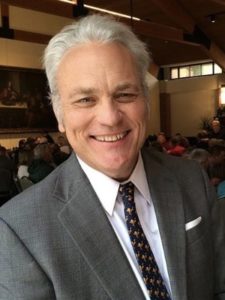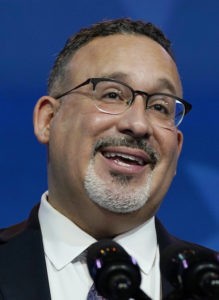Much of a pastor’s ministry happens in “behind-the-scenes” moments of pastoral care, and much of that care involves deep listening. Listening carefully and intently is a learned skill for many extroverted pastors like myself. But, especially in this moment of crisis for our nation and Christ’s church, we would do well to remember that listening is an act of love.
Many pastors, especially those of us engaged in the work for equality and social justice, prefer prophetic speech to the humble, loving posture of listening. We are convicted by the words of the Apostle Paul, who reminds us that “if I have prophetic powers … but do not have love, I am nothing.” As pastors, we are called to receive the needs of our congregants, by listening without judgment and offering ourselves as a compassionate presence.

Charles Foster Johnson
In the United States, our political leaders are called to a similar commitment of listening, but they are called to do even more. They are called to be representative voices for the people who elected them. We live in a nation where voters choose their leaders, not the other way around, and American democracy demands that our politicians listen to the voice of the people, across race and place.
In the November elections, despite long lines and racist voter suppression, the people made our voice heard through record turnout numbers and an overwhelming majority. Votes were carefully counted, and our hardworking local elected officials counted and verified ballots, in that sacred way that our nation listens to the will of the people.
Joe Biden and Kamala Harris have been elected president and vice president of the United States. They have assumed those roles because Americans elected a government of, by and for the people. Despite the violent and horrific attack on our government carried out on Jan. 6 by white supremacists and encouraged by powerful elected leaders, we witness the triumph of democracy.
Time to listen deeply to teachers
Now the work of listening begins. Right now, America needs leaders who listen deeply and translate that listening into good policy. We need policies that heal our nation — ensuring, health, safety and a path out of this pandemic.
That path to healing and transformation begins in America’s public schools. Since 2013, Pastors for Children has worked alongside our state’s public schools, listening to their needs in times of joy and times of crisis. And it is clear to me today: In the days of COVID, our nation’s schools are in crisis.
Former Secretary of Education Betsy DeVos, who resigned in response to the Jan. 6 Capitol violence, was a school privatizer and a charter school pusher. She is a major contributor to the crisis our schools face today. During this pandemic, DeVos demanded that our children be forced back into in-person education. Tragically, she tried to pit teachers and public school families against each other, blaming hard-working teachers for her department’s failures. DeVos spent her tenure listening to big-money special interests, not public school families and teachers who are trying to make ends meet.

Miguel Cardona
But America didn’t buy her lies, and soon a new secretary of education will be confirmed. The Biden-Harris administration is clearly signaling a shift away from DeVos’ privatization priorities with their selection of Miguel Cardona as secretary of education. Unlike DeVos, Cardona has a lifetime of experience working in public schools as a former member of the American Federation of Teachers.
I hope Cardona’s tenure as secretary of education involves listening to the teachers shut out during the DeVos years. More importantly, I hope his listening leads to action, because previous Democratic administrations have taught us that a posture of listening to teachers does not ensure the robust action our families need.
A secretary who came from the classroom
Cardona grew up in public housing in Connecticut. He could not speak English when he entered Meriden public schools. He became a teacher in the Meriden Public School system and quickly rose to become a principal and later superintendent. He spent 21 of his 23 years in the 8,000-student district, before becoming Connecticut’s state superintendent of schools. He is as local a public school educator as they come.
He dramatically improved the student performance of his poor children in Meriden by aligning with teachers. He focused on their professional development, collaborated with them in discovering more meaningful assessment of students, and, most important, cultivated a close relationship with the teacher unions. He did approve some charter schools, but he chose them highly selectively and placed them strategically.
In other words, he listened to the professionals closest to the children public schools are charged to serve — our teachers.
Failings of Obama administration
Although President Obama’s 2008 campaign and transition team signaled a similar willingness to protect public education and fight the influence of standardized testing, he chose a different path after becoming president. Almost immediately, Obama allied himself with Democrats for Education Reform, a Wall Street-backed PAC pushing standardized tests, expansion of unaccountable charter schools and attacks on teachers’ right to unionize. His education secretary, Arne Duncan, went on to promote DFER priorities throughout his tenure, and this disastrous lack of leadership “set the basis for Betsy DeVos’ privatization agenda.”
“Bipartisan politicians have spent 20 years attacking public schools through programs like No Child Left Behind and Race to the Top.”
Bipartisan politicians have spent 20 years attacking public schools through programs like No Child Left Behind and Race to the Top, but Americans across political divides agree: It’s time for America to move forward, and to put the days of DFER and DeVos behind us. We need to listen to the families, teachers and staff of our nation’s public schools, and then we need to implement policies that promote their success and growth.
A different path
Cardona could start this process by doing the same thing he did in Connecticut — build a close relationship with teacher unions. Across America, teachers’ unions guided our communities through this crisis, through their attempts to keep our families, schools and neighborhoods safe from COVID. They proposed measures that would allow flexible learning environments, and they advocated for safer classrooms and learning styles. Most importantly, they provided resources for parents, staff and teachers to work together and ensure community health and safety.
Our nation has work ahead of us, and we won’t solve the problems in our schools with privatization, charter school schemes or high-stakes standardized tests. We’ll solve it by listening to the families, teachers and staff most affected by the COVID crisis and by building public schools that are racially just, fully funded and centered on the needs of our children.
Charles Foster Johnson is founder and executive director of Pastors for Children, an advocacy group supporting public education. He lives in Fort Worth, Texas.
Related articles:
Why should private religious schools be exempt from health mandates?
Private school vouchers as civil rights? Baloney!
What will happen in public education with a Biden administration?
When it comes to funding public education, don’t eat your seed corn
Diane Ravitch wants you to think of public schools like police or fire departments


